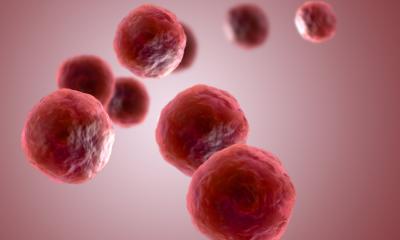News • Promising research
Could senescence be the key to stopping cancer?
Canadian researchers have found a promising way to stop tumour cells from multiplying.
In disrupting the composition of ribosomes, the team from Université de Montréal (UdeM) discovered a direct molecular mechanism to stop cancer cells from proliferating, which is called senescence. Their results have been published in Nature Cell Biology. “Ribosomes are complex machines composed of both RNAs and proteins that make all the proteins necessary for cells to grow,” said UdeM biochemistry professor Gerardo Ferbeyre, the study's senior author. Because cancer cells grow and spread relentlessly, they require a massive amount of ribosomes, he explained. Growing cells must coordinate the production of both ribosomal RNAs and ribosomal proteins in order to assemble them together in strict proportion to each other. “We were surprised, however, to find that if the production of ribosomal RNA-protein proportions are driven out of balance in a cancer cell, proliferation can be shut down by in a very simple and direct manner,” said Ferbeyre.

In their research, led by UdeM biochemistry researcher Frédéric Lessard and done in collaboration with biochemistry professor Marlene Oeffinger of the UdeM-affilated Montreal Clinical Research Institute, Ferbeyre and his team uncovered a new mechanism that uncouples ribosomal RNA from ribosomal protein synthesis to stop the proliferation of cells bearing oncogenic mutations. The team demonstrated an unbalanced ribosomal RNA and ribosomal protein synthesis during oncogene-induced senescence, a response that prevents cancer formation. In the lab, senescent cells shut down ribosomal RNA synthesis but kept producing ribosomal proteins. The team then showed that excess copies of a ribosomal protein called RPS14 could now bind and inhibit a key protein – cyclin-dependent kinase-4, or CDK4 – required to drive cell proliferation.
Lessard noted immediate therapeutic implications of the team's discovery. “A drug that shuts down ribosomal RNA biogenesis would immediately lead to an accumulation of ribosomal proteins outside the ribosomes, and since tumor cells make more of them, they would be preferentially affected by these kinds of drugs,” he said. Added Oeffinger: “The physical interaction of RPS14 with CDK4 is the most direct link between ribosome synthesis and cell proliferation regulatory pathways discovered to date. It is therefore likely a very specific way for cancer progression to be prevented."
Source: Université de Montréal
27.06.2018











